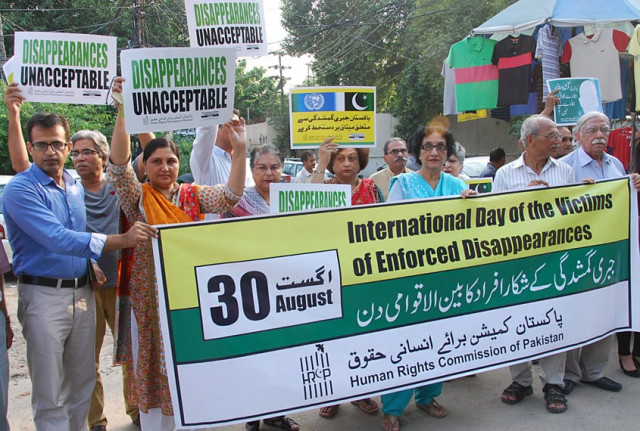Enforced disappearances: ‘Endless Misery for thousands of families
Rights activities demand criminalisation of enforced disappearances

Advocate Mohsin Hamdani demanded that the government probe cases of enforced disappearances and take notice of the plight of families whose loved ones had been missing for years. PHOTO: RIAZ AHMED/EXPRESS
In Lahore, several activists and lawyers gathered in front of the Press Club for a demonstration organised by the Human Rights Commission of Pakistan. The protesters shouted Jabri gumshada afrad ko bazyab karwaya jai (Recover victims of enforced disappearances) and band karo karo, band karo jabri gumshadi band karo (Put an end to enforced disappearances), among other slogans. They held up placards with strong messages including: Recover the missing; Ratify the UN convention against disappearances; Disappearances are unacceptable; Declare enforced disappearance a heinous crime.
Speaking to The Express Tribune, lawyer Hina Jilani said it was unfortunate that enforced disappearances were increasing. She said people could go missing overnight and no one would know about their whereabouts. “Their families and the Commission on Missing Persons took every possible step for their recovery but nothing came of it.”
She said it was a shameful and heinous crime committed by state. “The state has now started picking up women. That is even more frightening and shameful.”
She mentioned Zeenat Shahzadi, a journalist and an activist who has been missing for over a year. “The HRCP, the commission, her family left no stone unturned seeking her recovery to no avail.” She said they had taken the matter to the Supreme Court but the woman had not been recovered.
Letters seeking answers and pleading for her recovery were sent to the prime minister, the chief of army staff, parliamentarians and senators but no one responded. “These people have grown so stubborn and shameless they do not even bother to reply. We take their silence as an admission of guilt,” she said.
Advocate Mehmood Ahmad said they wanted the state to criminalise the act of enforced disappearance so that the perpetrators could be brought to justice.
Raja Ashraf, a human rights activist, said enforced disappearances were a sign of a rogue state.
He said that it was unfortunate that police and other law enforcement agencies abducted people and detained them illegally. When they were recovered by court bailiffs, no action was taken against those who had detained them. “This speaks of apathy on the state’s part.”
A statement issued by the Human Rights Commission of Pakistan, said large-scale disappearances in South Asia could be addressed if the governments in the region criminalised the act.

HRCP secretary general IA Rehman said that Sri Lanka’s ratification of the Convention on Enforced Disappearances and its pledge to criminalise the practice was a welcome step. “Other states in the region should follow suit and show that they are serious about their commitment to human rights by making disappearances a specific crime in their domestic laws.”
In Multan, scores of activists, teachers, journalists and lawyers walked from Nawan Shehr Chowk to the Multan Press Club holding banners with slogans condemning enforced disappearances.
Advocate Fahim Gill said it was time the government took appropriate measures to solve the problem. “Enforced disappearances have caused endless misery to thousands of families in Pakistan for several years.”
Advocate Shahbaz Gurmani said the Commission of Inquiry on Enforced Disappearances had published monthly reports. “The government must pay heed to these reports. It must admit that this is a serious human rights crisis which needs immediate attention.”
Gurmani said according to the reports, people had been picked up and put on trial, held at internment centres, sent in the custody of Rangers or killed in encounters.
Advocate Mohsin Hamdani demanded that the government probe cases of enforced disappearances and take notice of the plight of families whose loved ones had been missing for years.
According to statistics shared by the HRCP, 3,522 cases of enforced disappearances were reported to the Second Commission of Inquiry on Enforced Disappearances between March 2011, and July 31, 2016.
The largest number of cases reported to the commission was from Khyber Pakhtunkhwa (1,362), followed by Sindh (965), Punjab (682), Balochistan (265), Islamabad Capital Territory (110), the FATA (101), Azad Kashmir (36), and Gilgit-Baltistan (1).
Published in The Express Tribune, August 31st, 2016.



















COMMENTS
Comments are moderated and generally will be posted if they are on-topic and not abusive.
For more information, please see our Comments FAQ